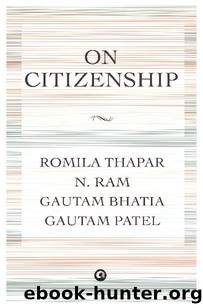ON CITIZENSHIP by unknow

Author:unknow
Language: eng
Format: epub
Publisher: Aleph Book
Published: 2021-01-10T00:00:00+00:00
Phase Two: Partitionâan Idea Challenged
The Drafting Committee worked through the fag end of 1947, and then 1948, to prepare a draft Constitution. But when the Constituent Assembly met to consider it, the world had changed. India was independent, and partitioned. The creation of Pakistan had taken place on explicitly communal lines. The violence of Partition remained fresh in memory. It was inevitable that when the Assembly considered the draft Constitution in the months of November and December 1948âand then again in August and September 1949âPartition would cast a long shadow over its deliberationsâand especially its deliberations on what it meant to be an Indian.
The first illustration of this occurred in the text of the citizenship clause itself. The simplicity of the original clause now needed to be complemented by a host of detailed provisions dealing with Partitionâthe very kind of detail that the members of the Constituent Assembly had been averse to go into the first time around. Faced with a host of amendments and additions, the chairman of the Drafting Committee, Dr B. R. Ambedkar, collated them and came up with a fresh draft of the citizenship clause, which he submitted to the Constituent Assembly in the autumn of 1949 (noting wryly that it was one of the two clauses that had given the Committee âmaximum headacheâ). The fresh clause now provided for citizenship to those who were born in the territory of India (in line with the previous draft), whose parents were born in India, or who had been resident in India for five years before the commencement of the Constitution; then it came to Partition: based on when an individual had migrated from Pakistan into India (before or after 19 July 1948), they were either unconditionally Indian citizens, or had to apply to register to be Indian citizens; and then there were provisions for citizens who had migrated back to India after initially migrating to Pakistan, subject to a licence system.
Ambedkar acknowledged that this bewildering profusion of provisions (5, 5A, 5AA, 5B, 5C) were designed to solve the immediate and specific problems presented by Partition, and were essentially âad-hocâ. These, he went on to state, were not meant to be âpermanentâ. âThe business of laying down a permanent law of citizenship,â he observed, âhas been left to Parliament...[and] Parliament may make altogether a new law embodying new principles.â
Was Ambedkar here providing a carte blanche to future Parliaments in laying down principles of citizenship? His words were certainly broad in character, and the âArticle 11 defenceâ rests upon attributing to him an unqualified acceptance of this proposition. As I shall show, however, a closer reading of the debates demonstrates that this would be too quickâand too easyâan interpretation.
Because, as the more than ten-hour-long debate on the citizenship provisions went on to show, there was a complex factual and principled matrix that underlay Ambedkarâs sparse language, much of which would be strongly challenged in the Assembly. The first set of challenges arrived long before even Ambedkar presented his fresh
Download
This site does not store any files on its server. We only index and link to content provided by other sites. Please contact the content providers to delete copyright contents if any and email us, we'll remove relevant links or contents immediately.
Never by Ken Follett(2877)
Fairy Tale by Stephen King(2061)
Will by Will Smith(2039)
Reminders of Him: A Novel by Colleen Hoover(1875)
The Dawn of Everything: A New History of Humanity by David Graeber & David Wengrow(1569)
The Dark Hours by Michael Connelly(1565)
The Stranger in the Lifeboat by Mitch Albom(1529)
Cloud Cuckoo Land by Anthony Doerr(1430)
Principles for Dealing With the Changing World Order: Why Nations Succeed and Fail by Ray Dalio(1373)
Friends, Lovers, and the Big Terrible Thing by Matthew Perry(1326)
HBR's 10 Must Reads 2022 by Harvard Business Review(1253)
The Strength In Our Scars by Bianca Sparacino(1239)
Go Tell the Bees That I Am Gone by Diana Gabaldon(1233)
Can't Hurt Me: Master Your Mind and Defy the Odds - Clean Edition by David Goggins(1225)
515945210 by Unknown(1206)
Love on the Brain by Ali Hazelwood(1091)
This Family Does It by Kevin Sellers(1080)
443319537 by Unknown(1071)
The Psychiatric-Mental Health Nurse Practitioner Certification Review Manual by Zakhari Raymond DNP EdM ANP-BC FNP-BC PMHNP-BC;(1021)
